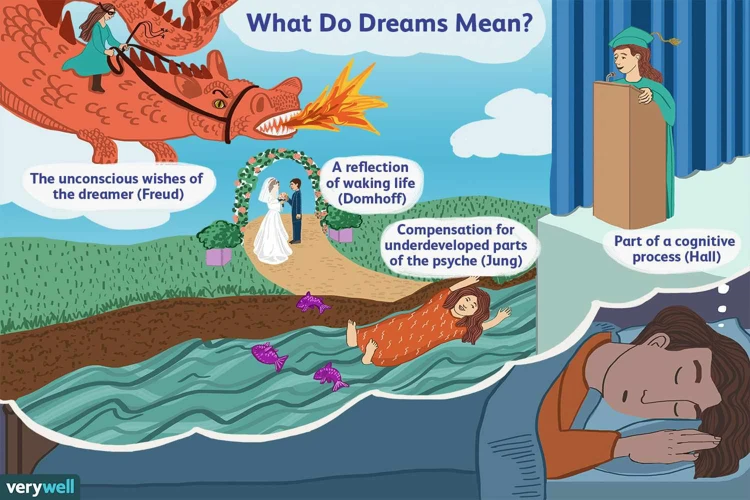Have you ever woken up from a dream feeling angry at someone, even though they had done nothing wrong in reality? The world of dreams and their meanings can be a perplexing and fascinating one. Why do we experience such intense emotions in our dreams? What could it possibly mean when we find ourselves mad at someone in a dream? In this article, we will delve into the realm of the unconscious mind and explore the various interpretations of anger in dreams. By understanding the purpose of dreams, the symbols they present, and the personal associations we have, we can begin to uncover the hidden messages behind our nocturnal frustrations. So, let’s embark on this journey of self-discovery and unravel the mysteries of our dream-filled nights.
Understanding Dreams

Dreams have long fascinated and puzzled mankind. They provide a gateway to the mysterious realm of the unconscious mind, where hidden desires, fears, and emotions find expression. The Purpose of Dreams remains a subject of debate among psychologists and philosophers. Some theories suggest that dreams serve as a way for our brain to process and organize daily experiences and memories, aiding in learning and problem-solving. Others believe that dreams provide a platform for our subconscious mind to communicate its deepest thoughts and desires. The Unconscious Mind is the driving force behind our dreams, influencing the symbolism and themes we encounter while we sleep. It holds memories, thoughts, and emotions that may be repressed or unacknowledged in our conscious state. Exploring these hidden aspects can lead to a better understanding of ourselves and our dreams. Dream Symbols and Meanings play a pivotal role in uncovering the messages within our dreams. Each symbol has its own significance and can vary based on personal experiences and cultural associations. For example, dreaming of someone cutting your hair may have /spiritual-meaning-of-someone-cutting-my-hair/ symbolic implications related to personal transformation or a loss of power. By delving into the layers of symbolism, we can gain insight into the deeper meanings behind our dreams.
1. The Purpose of Dreams
– Dreams serve a variety of purposes, and understanding their significance can provide valuable insights into our subconscious minds. One purpose of dreams is to help us process and organize our daily experiences and memories. They act as a way for our brain to make sense of the information it receives, aiding in learning and problem-solving. Another purpose is to provide a platform for our subconscious mind to express its deepest thoughts and desires. These hidden aspects of ourselves may be repressed or unacknowledged in our waking state, but they find a voice in our dreams. Exploring the symbolism and themes within our dreams can lead to a greater understanding of ourselves and our inner world.
2. The Unconscious Mind
The unconscious mind plays a significant role in shaping our dreams. It is a vast reservoir of thoughts, memories, and emotions that lie beneath our conscious awareness. This mysterious realm holds hidden desires, fears, and unresolved conflicts that often find expression in our dreams. Exploring the unconscious mind can provide valuable insights into ourselves and our dreams. For example, the presence of insects in dreams may have /biblical-meaning-of-insects-in-dreams/ symbolic implications related to persistence and resilience, while dreaming of shrimp may symbolize /shrimp-dream-meaning/ feelings of vulnerability or delicacy. By delving into the depths of the unconscious, we can begin to unravel the complex tapestry of our dreamscapes and gain a better understanding of ourselves.
3. Dream Symbols and Meanings
Dream Symbols and Meanings:
– Symbols in dreams hold significant symbolism and can vary based on personal experiences and cultural associations.
– Each symbol carries its own significance, and understanding the meaning behind them can provide insight into the messages of our dreams.
– Dream symbols can range from common objects or animals to abstract concepts and surreal scenarios.
– It’s important to consider the context of the dream and personal associations with the symbols.
– Keeping a dream journal can help identify recurring symbols and their potential meanings.
– Consulting dream dictionaries or seeking interpretations from experts can provide additional guidance in uncovering dream symbolism.
Interpreting Anger in Dreams

When it comes to , it’s important to understand that dreams are often a reflection of our emotional state. Emotions in Dreams can be intensified, exaggerated, or even entirely different from our waking emotions. Anger in dreams is no exception, and it can signify a wide range of emotions, including frustration, resentment, or even suppressed anger. Symbolism of Anger in dreams can also provide insights into the underlying issues we may be facing. For example, anger towards someone in a dream could represent unresolved conflicts or unresolved feelings towards that person. Similarly, anger can represent feelings of powerlessness or a need to assert oneself in waking life. Personal Associations play a crucial role in interpreting anger in dreams. The relationship we have with the person we are angry at in the dream, as well as the context of the dream itself, can provide valuable clues to its meaning. By exploring these elements, we can unravel the mysteries of anger in our dreams and gain a deeper understanding of our emotions and relationships.
1. Emotions in Dreams
Our dreams are not only visual narratives; they are also rich with emotions that can range from intense fear to overwhelming joy. In the context of , it is important to understand that the emotions we experience in our dreams may not always directly correspond to the situations or events depicted. Sometimes, we may feel anger towards someone in a dream, even if that person hasn’t done anything to provoke such feelings in reality. These emotions in dreams often serve as a reflection of our inner thoughts and subconscious desires, allowing us to process and explore our feelings in a safe and symbolic environment. By paying attention to the emotions we experience during dreams, we can gain valuable insights into our own psyche and emotional well-being.
2. Symbolism of Anger
Anger, as a prominent emotion, also holds significance in the realm of dreams. When we find ourselves mad at someone in a dream, it can symbolize a variety of things. Symbolically, anger in dreams may represent unresolved conflicts, repressed frustrations, or unexpressed emotions. It could be a manifestation of our inner turmoil or an indication of the need to address and confront certain issues in our waking life. It’s important to consider the specific context and personal associations surrounding the anger in order to gain a deeper understanding of its symbolic meaning in our dreams.
3. Personal Associations
When it comes to dreams, personal associations play a crucial role in interpreting their meaning. Personal Associations refer to the individualized connections we have with certain people, objects, or situations. These associations are deeply rooted in our personal experiences, memories, and emotions. For example, if you dream of being angry at someone, consider your relationship with that person in real life. Are there any unresolved conflicts or unexpressed emotions between you? Your feelings towards them in the dream may reflect your true feelings in the waking world. Additionally, certain symbols may hold personal significance. For instance, if you have a fear of insects, dreaming about insects may symbolize feelings of anxiety or vulnerability. Understanding your personal associations can provide valuable insights into the underlying emotions and messages conveyed by your dreams.
Common Dream Scenarios

Dreams come in various forms and often present us with scenarios that evoke strong emotions and vivid experiences. can offer valuable insights into our subconscious mind and provide clues about our waking life. One frequent scenario involves Arguing with a Loved One. In these dreams, we may find ourselves engaged in heated debates or conflicts with those closest to us, leaving us feeling frustrated or even betrayed upon waking. Another common dream scenario is Conflict with an Enemy. In these dreams, we may be pitted against an adversary or facing off against someone we perceive as a threat. The intense emotions felt during this dream scenario can reflect unresolved conflicts or power struggles in our waking relationships. Lastly, Frustration with a Friend is another common scenario that can leave us feeling perplexed. In these dreams, we may experience instances where a friend lets us down or acts in ways that upset us. Examining the reasons behind these dream scenarios can provide valuable insights into our relationships and the dynamics that exist within them.
1. Arguing with a Loved One
Arguing with a loved one in a dream can evoke strong emotions and leave us perplexed upon waking. This dream scenario may reflect unresolved conflicts or tensions within the relationship. It could symbolize a need for communication and understanding between you and your loved one. Interpreting this dream depends on the personal associations you have with the individual involved, as well as the context of the dream. It’s essential to consider your feelings during the dream and upon waking up. Is there a specific issue or concern that needs to be addressed in your waking life? Exploring these aspects can help unravel the possible meanings behind arguing with a loved one in the dream realm.
2. Conflict with an Enemy
Dreaming about a conflict with an enemy can evoke strong emotions and leave us perplexed upon waking. In the realm of dreams, our enemies may represent individuals we perceive as threats or adversaries in our waking life. The symbolism of anger in this scenario could indicate unresolved conflicts or power struggles that we may be experiencing with someone in our real life. Alternatively, it could represent inner conflicts or negative aspects of ourselves that we are struggling to confront. Interpreting this dream requires considering personal associations and the specific dynamics of the conflict. Reflecting on the underlying emotions and exploring potential resolutions can provide valuable insights into the root causes of the conflict and guide us towards finding resolution and peace.
3. Frustration with a Friend
Dreams have a way of reflecting our relationships and interactions with others, even if they are not direct representations of reality. In the case of frustration with a friend in a dream, it could signify underlying tension or unresolved issues within the friendship. The dream may manifest as arguments, misunderstandings, or a general sense of discord. Frustration with a friend in a dream could be a symbol of unaddressed grievances or unfulfilled expectations. It is essential to consider the context of the dream and the dynamics of the relationship to gain a deeper understanding of its meaning. Reflecting on the dream and open communication with the friend could help unravel any hidden resentment or frustrations that exist, leading to a healthier and more harmonious friendship.
Exploring Possible Interpretations

When it comes to exploring the possible interpretations of anger in dreams, there are several intriguing avenues to consider. Dealing with Unresolved Issues is one potential explanation. Dreams often serve as a platform for our unconscious mind to address unresolved conflicts or emotions that we may have pushed aside in our waking lives. These dreams of anger towards someone might be an indication that there are unresolved issues or lingering resentments that need to be acknowledged and addressed. Expressing Suppressed Feelings is another interpretation. Sometimes, we may suppress our anger or frustration towards someone in our waking life, fearing confrontation or negative consequences. In dreams, this suppressed anger may find a way to manifest itself, providing a space for us to acknowledge and release those emotions in a safe environment. Fear of Confrontation is yet another possibility. Dreams of anger towards someone may stem from a fear of confrontation or the inability to express our true feelings in waking life. These dreams can be an invitation to explore our fears and find healthier ways to assert ourselves and communicate our needs. By considering these interpretations, we can gain insight into the underlying messages and emotions that our dreams are trying to convey.
1. Dealing with Unresolved Issues
When we find ourselves mad at someone in a dream, it can often be a reflection of dealing with unresolved issues. Dreams have a way of bringing our unconscious conflicts to the forefront, giving us an opportunity to confront and resolve them. If you consistently dream of being angry at someone, it may indicate lingering feelings of resentment or unfinished business in your waking life. It could be a cue to address these unresolved issues head-on, whether through open communication, forgiveness, or seeking closure. Paying attention to the specific circumstances and emotions surrounding the anger in your dream can provide valuable insights into the areas of your life that require attention and resolution.
2. Expressing Suppressed Feelings
Expressing suppressed feelings is another possible interpretation when you find yourself mad at someone in a dream. Dreams often provide a safe space for our unconscious mind to express emotions that we may have difficulty acknowledging or expressing in our waking life. The dream scenario of being angry at someone could be a reflection of pent-up anger or frustration that we have kept hidden or suppressed. In dreams, these suppressed feelings may manifest in exaggerated or heightened ways, allowing us to release and process these emotions in a controlled environment. It is important to pay attention to the specific individuals or situations in our dreams to understand the underlying emotions and address any unresolved issues that may be contributing to these suppressed feelings.
3. Fear of Confrontation
3. Fear of Confrontation:
– Some dreams where we are mad at someone may stem from a fear of confrontation. In waking life, we might avoid confrontation because we fear the potential consequences or the discomfort it brings. This fear can manifest in dreams as anger towards someone, reflecting our subconscious desire to express our feelings but being unable to do so directly. Our dreams create scenarios where we can safely experience and explore the emotions associated with confrontation. These dreams can provide an opportunity for self-reflection and help us identify situations where we may be avoiding confrontation in our waking life. By acknowledging and addressing our fear of confrontation, we can work towards healthier communication and resolution in our relationships.
Tips for Analyzing Your Dreams
Analyzing your dreams can be a valuable tool for self-discovery and personal growth. Here are some to help you unlock the hidden messages within them. First, consider keeping a dream journal. Writing down your dreams immediately upon waking can help you remember the details and emotions more accurately. Next, pay attention to symbols in your dreams. Symbols can carry personal meanings or cultural significance that can shed light on the message your unconscious mind is trying to convey. Finally, consider the personal context surrounding your dream. Your current life experiences, relationships, and emotions can provide clues to the meaning behind the dream. By utilizing these techniques and approaching your dreams with curiosity and openness, you can gain a deeper understanding of yourself and your subconscious mind.
1. Keep a Dream Journal
1. Keep a Dream Journal: Keeping a dream journal is a valuable practice for understanding the complexities of your dreams. By recording your dreams immediately upon waking, you can capture important details and emotions that may fade from memory throughout the day. Use a notebook, journal, or even a smartphone app dedicated to documenting your dreams. Include as much detail as possible, noting any recurring themes, symbols, or emotions. Making a habit of journaling your dreams can help identify patterns, uncover hidden meanings, and track personal growth over time. Additionally, you can create categories or tables to organize your dreams based on common themes or people involved, making it easier to analyze and compare them later on.
2. Pay Attention to Symbols
When analyzing your dreams, it’s crucial to pay close attention to the symbols that appear. Symbols are like a hidden language within our dreams, conveying deeper meanings and messages. One way to interpret symbols is by exploring their personal significance. For example, if you dream about insects, such as spiders or bees, you can delve into the /biblical-meaning-of-insects-in-dreams/ spiritual and symbolic meanings associated with these creatures. Additionally, keeping a dream journal can help you identify recurring symbols and patterns over time. By documenting and reflecting on the symbols in your dreams, you can uncover valuable insights into your subconscious mind.
3. Consider Personal Context
When analyzing your dreams and their possible meanings, it is crucial to consider your personal context. This involves examining the specific details of your dream and relating them to your own life experiences, emotions, and relationships. Keeping a Dream Journal can be especially helpful in understanding recurring themes or patterns in your dreams. Take note of any relevant details such as people, locations, or objects that stand out to you. Additionally, reflect on your current circumstances and recent events in your life that may have influenced the content of your dream. By considering your personal context, you can gain a deeper understanding of the underlying messages and emotions conveyed in your dreams.
Conclusion
In , exploring the unconscious and understanding the meaning of anger in dreams can provide valuable insights into our inner world. Dreams serve a purpose, whether it is processing emotions, dealing with unresolved issues, or expressing suppressed feelings. By analyzing the emotions and symbols present in our dreams, we can gain a deeper understanding of ourselves and our relationships. Keeping a dream journal and paying attention to personal context and symbols can enhance the dream interpretation process. While dreams may not always have a definitive meaning, they offer a unique opportunity for self-reflection and personal growth. So, next time you find yourself mad at someone in a dream, don’t dismiss it as just a random occurrence. Instead, embrace it as a chance to delve into the complexities of your psyche and uncover hidden truths within.
Frequently Asked Questions
1. Can dreams predict the future?
There is no scientific evidence to support the notion that dreams have the ability to predict the future. However, some individuals may experience intuitive insights or symbolic representations in their dreams that could align with future events or personal experiences.
2. Why do we forget our dreams?
Forgetting dreams is a common occurrence due to the nature of our sleep cycles. Dreams are primarily experienced during the REM (rapid eye movement) stage of sleep, which is followed by deep sleep. During this transition, it becomes challenging for our brain to retain and recall dream memories.
3. Can dream symbols have universal meanings?
Dream symbols can have personal, cultural, and universal meanings. While some symbols may have collective interpretations across cultures or historical contexts, it’s essential to consider personal associations and experiences when interpreting dream symbols.
4. Do recurring dreams have significance?
Recurring dreams often carry a deeper significance. They may indicate unresolved issues, persistent thoughts, or recurring emotional patterns that need attention and introspection. Exploring the themes and emotions of your recurring dreams can provide valuable insights.
5. Why do some people have lucid dreams?
Lucid dreaming occurs when a person becomes aware that they are dreaming while still in the dream state. The reasons behind lucid dreaming are not entirely understood, but certain practices like reality checks, meditation, and dream journaling can increase the likelihood of having lucid dreams.
6. Can dreams help with problem-solving?
Dreams can potentially aid in problem-solving by offering alternative perspectives, creative insights, or subconscious processing of information. Keeping a dream journal and reflecting on dream content may help harness the problem-solving potential of dreams.
7. Why do we experience emotions in dreams?
Emotions in dreams are a reflection of our subconscious mind and can arise from various sources, such as unresolved conflicts, repressed desires, or intense real-life experiences. Dreams provide an outlet for these emotions to surface and be processed in a symbolic form.
8. Can nightmares have positive meanings?
Although nightmares can be distressing, they can also hold positive meanings. Nightmares often serve as wake-up calls, highlighting internal fears, anxieties, and unresolved issues that need to be addressed. Through understanding and addressing these fears, personal growth and healing can occur.
9. Can everyone interpret dreams?
While everyone can attempt to interpret dreams, it requires practice, self-reflection, and an understanding of symbolism and personal context. Professional dream analysts or therapists who specialize in dream interpretation can provide valuable guidance for those seeking a deeper understanding of their dreams.
10. Do animals dream too?
Scientific evidence suggests that animals, especially mammals, experience REM sleep, which is associated with dreaming. The exact content and nature of animal dreams are yet to be fully understood, but their brain activities during sleep resemble those of humans, indicating the possibility of dreaming.








